This year's crop of faculty books is nothing to sneeze at! Exploring themes from the Middle Ages to the present day, from the page to the stage to the screen to the classroom, these books are timely and thought-provoking. Each, of course, adds richness not just to the fields to which they contribute, but also to our department life. Congratulations to all our faculty authors!
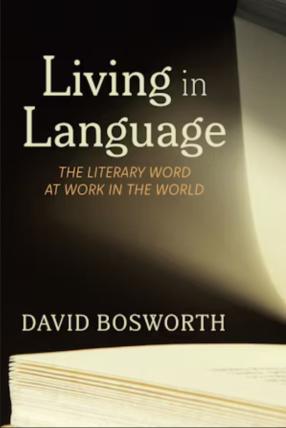
David Bosworth, Living in Language: The Literary Word at Work in the World
Front Porch Republic Books, 2024
In Living in Language, David Bosworth makes a compelling case for the power and relevance of the literary imagination throughout history. In a series of essays both lyrical and analytical, he examines how certain works have engaged the most pressing problems of their authors' ages even as they illuminate challenges that still haunt the world. The topics addressed are rich and various: the evolutionary significance of metaphorical reasoning; how Hitler's infatuation with an opera's plot predicted the arc of his horrific reign, even as his victims employed the power of narrative to endure his crimes; the ways in which Melville's late fiction foresaw the sources driving America's current cultural crisis; and how, in probing his era's political turmoil, Shakespeare's plays supply clues to resolving the current era's. From the spiritual quest of a musical prose to the cinematic craft of amending America's foundational story; from the myth of the Fall to novels that probe the Internet's impact on our lives today, Bosworth reveals how the literary imagination honors the "living" prescribed by the human predicament, evoking its beauty while never stinting on its uncertainties, cruelties, and pain.
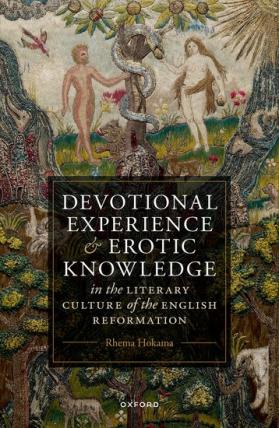
Rhema Hokama, Devotional Experience and Erotic Knowledge in the Literary Culture of the English Reformation
Oxford University Press, 2023
From our newest professor, joining the English faculty in Winter 2025! This book explores the ways in which Calvinist experientialism functioned as both theology and epistemology in the poetry of five early modern English poets: William Shakespeare, Robert Herrick, John Donne, Fulke Greville, and John Milton. In both official church ecclesiology and informal devotional practice, the Reformation introduced the idea that an individual’s experience of devotion did not only entail feeling, but also thought. For early modern English people, bodily experience offered a means of corroborating and verifying devotional truth, making the invisible visible and knowable. Hokama maintains that these religious developments gave early modern thinkers and poets a new epistemological framework for imagining and interpreting devotional intention and access. These Reformed models for devotion not only shaped how people experienced their encounters with God; the changing religious landscape of post-Reformation England also held profound implications for how English poets described sexual longing and access to earthly beloveds in the literary production of the period. In placing the works of English poets in conversation with devotional writers such as William Perkins, Samuel Hieron, Joseph Hall, and William Gouge, Hokama demonstrates how the English Calvinist tradition attributed epistemological potential to a wide range of ordinary experience, including sexual experience.
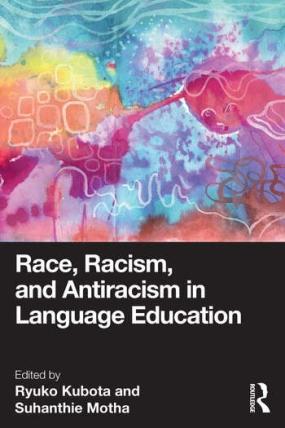
Suhanthie Motha, co-editor, Race, Racism, and Antiracism in Language Education
Routledge, 2024
Building on the pioneering 2009 volume, Race, Culture, and Identities in Second Language Education, this book, co-edited by Motha and Ryuko Kubota of the University of British Columbia, reflects the significant expansion in the research since its publication and offers a wider breadth of perspectives on the complex theoretical terrain of race, racism, and antiracism in language education. Contributors to the collection apply a range of conceptual and methodological lenses to teaching diverse world languages.
Underscoring the interconnectedness of race and colonialism, world language education, and intersectional ideologies, this book offers a forum for engaged dialogues among teachers, teacher educators, teacher candidates, graduate and advanced undergraduate students, curriculum developers, policymakers, and educational researchers in a wide range of disciplines, including language education. In covering important theoretical frames and constructs—including raciolinguistic and anti-oppressive pedagogies, decoloniality, neoliberalism, and reverse linguistic stereotyping—this book breaks from the Global North norms in applied linguistics and language instruction.
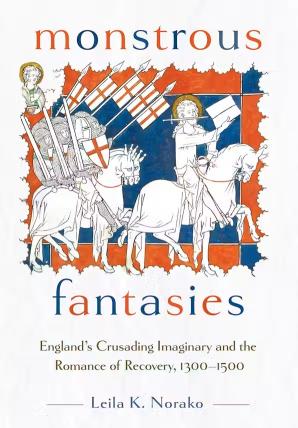
Leila K. Norako, Monstrous Fantasies: England's Crusading Imaginary and the Romance of Recovery, 1300-1500
Cornell University Press, 2024
Monstrous Fantasies asks why medieval romances reimagining the crusades ending in a Christian victory circulated in England with such abundance after the 1291 Muslim reconquest of Acre, the last of the Latin crusader states in the Holy Land, and what these texts reveal about the cultural anxieties of late medieval England. Leila K. Norako highlights the impact that the Ottoman victory and subsequent massacre of Christian prisoners at the battle of Nicopolis in 1396 had on intensifying the popularity of what she calls recovery romance.
These two episodes inspired a sense of urgency over the fate of the Holy Land and of Latin Christendom itself, resulting in the proliferation of romances in which crusading English kings like Richard I and anachronistic legends like King Arthur not only reconquered Jerusalem but committed genocidal violence against the Muslims. These romances, which—as Norako argues—also influenced Geoffrey Chaucer's Canterbury Tales, conjure fantasies of an ascendant global Christendom by rehearsing acts of conquest and cultural annihilation that were impossible to realize in the late Middle Ages. Emphasizing the tension in these texts between nostalgia and anticipation that fuels their narrative momentum, Monstrous Fantasies also explores how the cultural desires for European and Christian hegemony that recovery romances versified were revived in the wake of the so-called wars on terror in the twenty-first century in such films as Kingdom of Heaven and American Sniper.
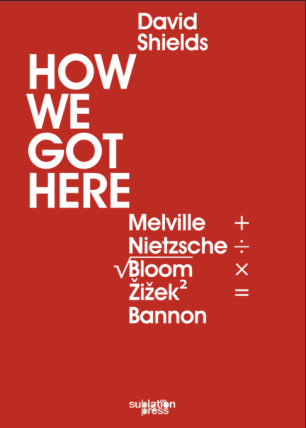
David Shields, How We Got Here: Melville Plus Nietzsche Divided by the Square Root of (Allan) Bloom Times Zizek (Squared) Equals Bannon
Sublation Press, 2024
Kellyanne Conway, Donald Trump, Rudy Giuliani, Q-Anon, Fox News, etc., etc., etc. have kidnapped the last century of intellectual thought and philosophical investigation: poststructuralism, quantum physics, deconstruction, the current “crisis” in “nonfiction”-journalism- media-“truthiness.” If the perceiver, by his very presence, alters what’s perceived, Steve Bannon, Vladimir Putin, Vladislav Surkov (performance-artist-turned-Putin-strategist), et al. have quite consciously created—are all still quite consciously creating on a day-by-day basis—a universe in which nothing is true and therefore public discourse is, in effect, over. Dominion Voting Systems was founded to rig elections for Hugo Chavez; Italian space lasers modified voting machine data; the FBI staged the January 6 attack: this is a strategy that goes back at least as far as Dostoevsky’s underground man. God is dead, so everything is permitted. Or is it? How We Got Here – provocative, accessible, persuasive, and addictive – is a crucial intervention in which David Shields argues that Melville plus Nietzsche divided by the square root of (Allan) Bloom times Žižek (squared) equals Bannon.
The companion film is now streaming on Amazon Prime and other platforms; temporarily, you can watch the film for free here.

David Shields, A Christian Existentialist and a Psychoanalytic Atheist Walk into a Trump Rally
Sublation Press, 2024
A Christian Existentialist and a Psychoanalytic Atheist Walk Into a Trump Rally is perhaps the only genuinely original thing you have read yet about Donald Trump. It can be read in a variety of ways: as a psychological investigation of Trump, as a philosophical meditation on the relationship between language and power, as a satirical compilation of the “collected wit and wisdom of Donald Trump,” and above all as a dagger into the rhetoric of American political discourse—a dissection of the politesse that gave rise to and sustains Trump. The book’s central thesis is that we have met the enemy and he is us.